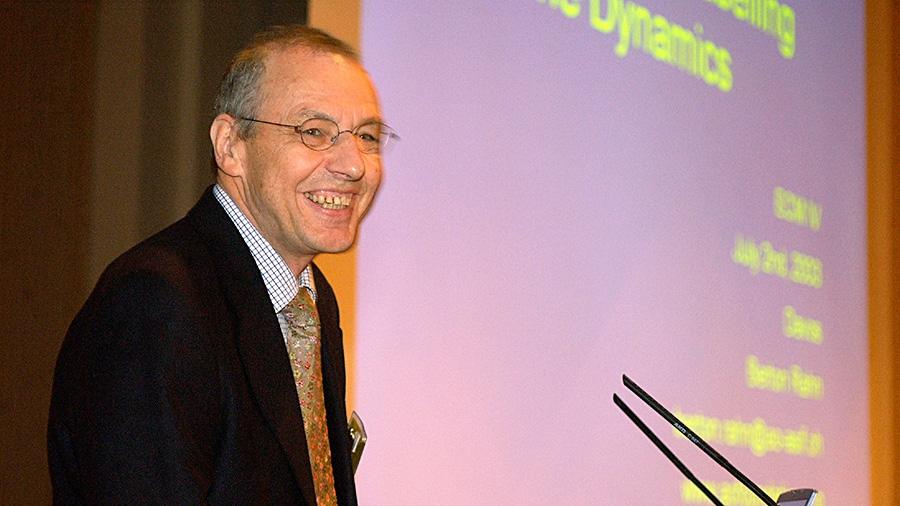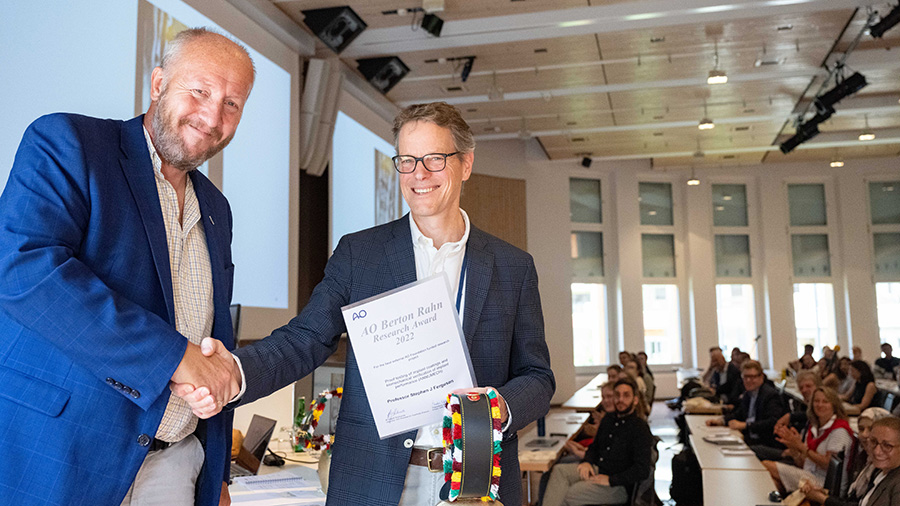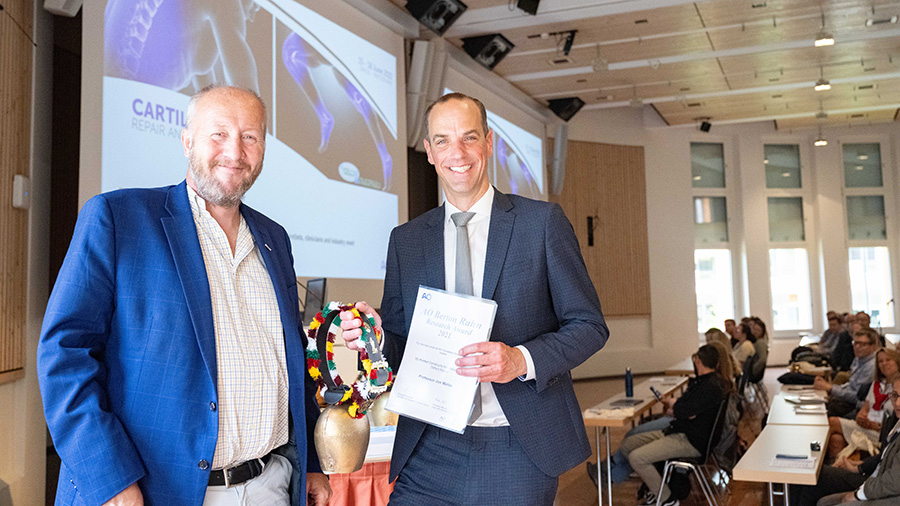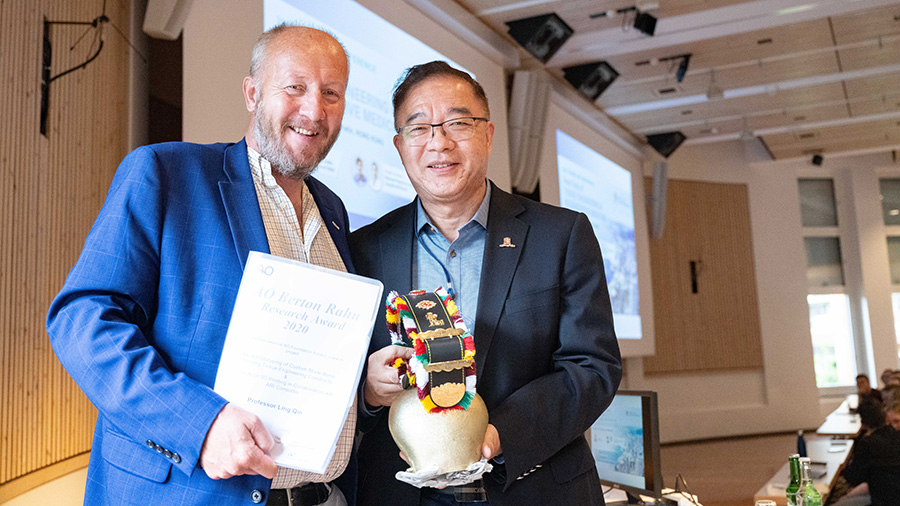The Berton Rahn Research Award—the three most recent winners

The late Berton Rahn during the European Cells and Materials (eCM) conference, Davos, Switzerland, July 2003
Every year, the best AO Foundation-funded research is honored with the Berton Rahn Research Award. The most recent award winners are Prof Dr Stephen Ferguson, Prof Dr Jos Malda, and Prof Dr Ling Qin.
Initially known as the AO Research Fund Prize, the Berton Rahn Research Award was renamed in 2009 to recognize the numerous contributions made to the AO Foundation by Prof Dr med Dr med dent Berton Rahn. Prof Rahn, whose histological work on bone remodeling is world-renowned, joined the AO Research Institute Davos (ARI) in 1968 and became its vice-director in 1975. He passed away in March 2008.
In 2022, Prof Dr Stephen Ferguson won the Berton Rahn Research Award. Prof Ferguson, professor of biomechanics at ETH Zurich, has collaborated for almost three decades with the AO Research Institute Davos (ARI), where he completed a research internship in 1994 and a PhD in hip joint and soft tissue biomechanics from 1996 to 2000.
In his work, Prof Ferguson focuses on the biomechanics of age-related diseases of the musculoskeletal system. With his research group, he develops new treatment methods based on novel biomaterials and fabrication methods for conditions related to increased bone fragility and disc degeneration.
One example is ANNUMECH, for which Prof Ferguson received this year's Berton Rahn Research Award. The project yielded a new method for fabricating fibrous membranes that can be used to repair lesions of the annulus fibrosus—the hard circular exterior that encases the soft inner core of intervertebral discs. The team successfully modified the already established biofabrication method of electrospinning, which employs electrostatic forces to create fine fibers.
"However, conventional electrospinning produces fibers in random orientation with tight spacing, which hampers cell and tissue growth," explains Prof Ferguson. "We were able to improve the process to achieve both specific fiber orientation and sufficient inter-fiber spacing."
The team also succeeded in furnishing the membranes' sides with differing characteristics—while one enhances cell and tissue adhesion, the other prevents it. The latter is particularly important in treatments deployed in close proximity to the sensitive neural structures of the spine.
The recipient of the 2021 Berton Rahn Research Award is Prof Dr Jos Malda, head of research at the Department of Orthopaedics, University Medical Center Utrecht and the Department of Clinical Sciences, Faculty of Veterinary Medicine, University of Utrecht.
Prof Malda places his research emphasis on the interplay between biology and technology. He examines how biofabrication technologies can contribute to the treatment of musculoskeletal diseases, for example, through the recreation of three-dimensional (3D) biological environments as a means of fostering tissue regeneration.
Prof Malda won the Berton Rahn Research Award in recognition of 3D-JOINT, a research project on the treatment of osteochondral defects, specifically osteoarthritis (OA). In collaboration with ARI and with funding from the European Research Council (ERC) and the AO Foundation, he and his team developed a 3D bio-printer to produce durable and mechanically stable joint replacements. Rather than printing layer by layer, the device utilizes a converged printing process. Several distinct fabrication steps occur simultaneously, allowing for the controlled deposition of microfibers and cells.
"We can alternate in whatever way necessary between printing cell-laden hydrogels on the one hand and resorbable thermoplastic polymers on the other," says Prof Malda. The result is a better integration of cartilage and bone components. At the interface between the engineered cartilage and the bone, the process fuses microfibers with a calcium phosphate-based bone compartment, resulting in a more durable connection. Prof Malda expects prospective applications both in human and veterinary medicine.In 2020, the Berton Rahn Research Award went to Prof Dr Ling Qin, director of the Musculoskeletal Research Laboratory at the Chinese University of Hong Kong's Department of Orthopaedics and Traumatology. Prof Qin also holds a joint professorship at Shenzhen Institutes of Advanced Technology of the Chinese Academy of Sciences.
After obtaining his PhD in Cologne, Germany, Prof Qin joined ARI in 1992 for a postdoctoral fellowship. The focus of his research is on the development of innovative methods for the diagnosis, prevention, and treatment of bone metabolic disorders such as osteoporosis and osteonecrosis.
Prof Qin won the 2020 Berton Rahn Research Award for the RAPIDOS project, in which a number of Chinese and European institutions formed a research consortium in 2013. It aimed to develop new methods for treating bone fractures where the healing process is hampered by conditions including osteonecrosis, which progressively kills bone and blood vessel forming cells due to a lack of blood supply. The researchers set out to create custom-made artificial bone graft substitutes made of resorbable polymer and calcium phosphate ceramic composites to act as scaffolds for bone tissue engineering.
"The aim was to also incorporate bioactive materials with the ability to trigger bone regeneration and formation as well as vessel formation," explains Prof Qin. "We identified herbal components with the potential to stimulate new bone formation, such as the bone anabolic compound icaritin. We were able to isolate this material from the Chinese herb epimedium and integrate it into the scaffolds using a unique 3D-printing technology." The team also successfully used biodegradable magnesium powder to make 3D-composite scaffold materials for bone substitutes to treat challenging bone defects.Until 2017, the Berton Rahn Research Award was awarded annually in honor of the best completed AO Start-up grant project. Today, the award, which consists of a keynote presentation at the AO Research Institute's (ARI) eCM conference and a certificate, is open to any AO-funded research.




